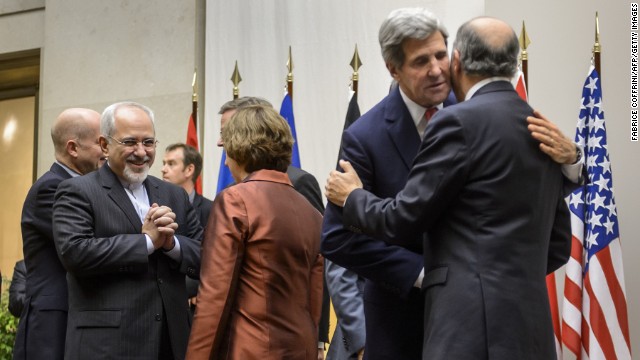Iran Nuclear Deal Criticized By Conservatives
The historic Iran nuclear deal was criticized by Iranian conservatives after a number of signatories of the deal were described as “untrustworthy” by the Supreme Leader Ayatollah Ali Khamenei. The remarks of Khamenei alluded to Britain and the United States, which are reviled as the “Little and Great Satans” by the revolutionary theocracy of Iran.
The comments are significant since the conservative cleric is the final arbiter when it comes to state policies in the dual republican and clerical system of Iran. However, Khamenei also showed guarded appreciation for the deal highlighting its significance. He also advised calm, which may refer to the increasing hopes of an end to the isolation of Iran or the tension between the supporters and critics of the deal.
In contrast, President Hassan Rouhani praised Mohammad Javad Zarif, the foreign minister of Iran. Critics were quick to attack the deal, which limits the nuclear program of Iran in exchange for the lifting of international sanctions.
However, there are some inconsistencies in the interpretation of Iran and the US on what was agreed on in the deal. Mohammad Kazem Anbarlui of Resalat, a conservative Iranian newspaper, pointed out significant differences on the fact-sheet of Iran with the things mentioned by President Barack Obama after the Iran nuclear deal was finalized.
Anbarlui said the text of the deal has a number of phrases that may be misinterpreted or are ambiguous, and the US version of the fact sheet did not show the red lines outlined on the Iranian fact-sheet.
A number of conservatives considered the Iran nuclear deal with Washington as a deal with the devil. The critics also made their presence felt on the streets with the announcement of the deal. The Basij militia was supposedly present at the Vanak Square as young people celebrated the finalization of the deal.
The Basij along with Revolutionary Guards Corp leaders have a huge influence in the Middle Eastern country. Numerous policies of former president Mohammad Khatami were opposed by the leaders of the Guards. The Basij and the Guards also suppressed street protests following the reelection of President Mahmoud Ahmadinejad.
A political campaign was started by critics of the moves of Rouhani in reaching out to the West, as they expressed concern on the possible concessions during the nuclear negotiations. Following a conference entitled “We are worried about a bad deal,” they were simply labeled as “The Worried.” “The Worried” is a term used to describe groups associated with hardliners within Iran as well as the critics of the government of Rouhani.
The group is doubtful about the trust the Rouhani government aims to establish with the US. However, Zarif revealed that he wanted the Iran nuclear deal to serve as the catalyst for new relations between Iran and the United States in order to deal with significant “common challenges” within the region, particularly the presence of the Islamic State in the region.
But, Khamenei did not support the idea. He told a student last week that the finalization of the Iran nuclear deal does not show any changes in the embodiment of the United States of “global arrogance” and the fight should continue.
Mohammad Sarafi wrote that the Iran nuclear deal will not result to an increased cooperation between the United States and Iran in the region, but will result to an increase in tension between the two countries. Sarafi added that this is not the first time some traitors attempted to cover the face of the Great Satan. These “traitors” believe that Iran should give in to the hegemony of the United States, Sarafi added.
The deal was described as a turning point for the Islamic Republic, and the day the “Death to America!” revolutionary slogan became useless. While the possible reopening of the US embassy in Tehran once the Iran nuclear deal is finalized was discussed by former President Akbar Hashemi Rafsanjani last week, it may not happen soon.
Abbas Abdi, a student who took part in the attack of the US embassy in 1979 before becoming a reformist, said it may take time before the US embassy will reopen in Tehran. Abdi added that the US-Iran relations cannot be considered as an international issue since it is held captive by domestic political rivalries within the two countries.
